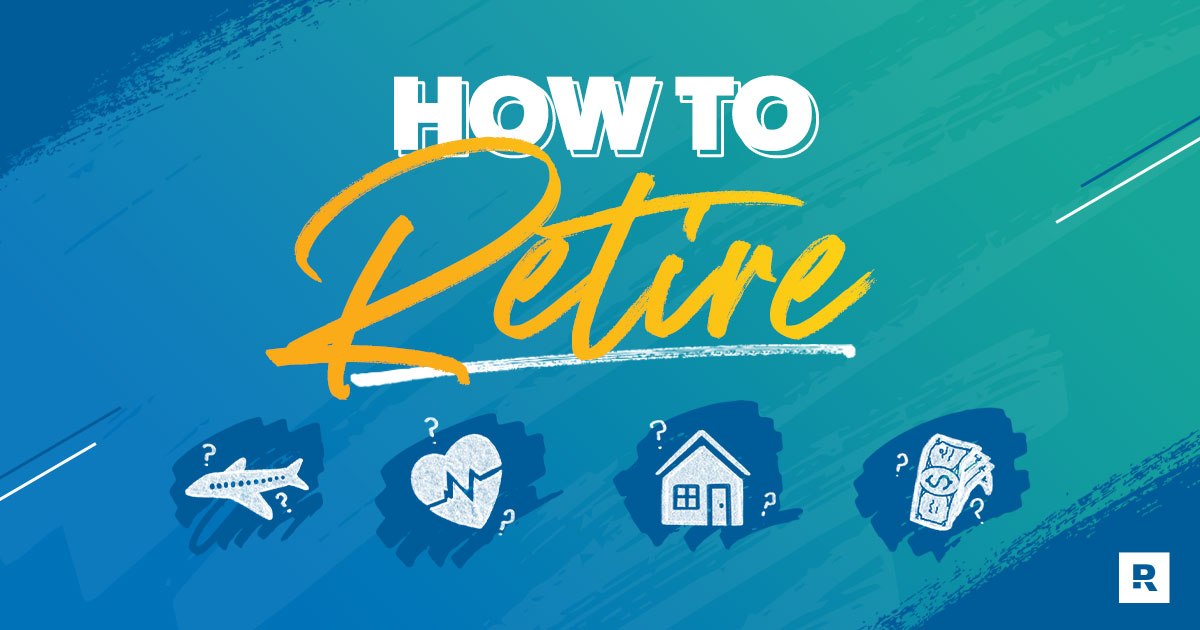How to Retire, Step by Step
10 Min Read | Sep 6, 2023

You’ve been working toward this for decades. It’s so close you can almost reach out and touch it. . .the day you walk away from work and into a new season of life called retirement!
But hold on, guys. You can’t just pack up your office one day, hop on a plane to Florida, and dive into retirement without a second thought.
Let’s talk about the specifics on how to retire with a step-by-step plan.
1. Know how much money you’ll need to retire.
Retirement isn’t an age—it’s a financial number. It’s the amount of money you need in order to live out your retirement dreams. Have you ever sat down to calculate your nest-egg number? Once you know the number you’re aiming for, you can make a plan to reach it!
2. Talk with someone.
It’s not enough to have a money goal in mind. You also need to have a vision for what the rest of your life will look like. Retirement is a huge emotional, mental and social transition.
If you’re married, set up a “dream date” with your spouse to talk about your future together. For the first time ever, you’ll have both time and money on your hands. That might be overwhelming, or even cause some conflict, if you don’t have a plan!
And if you’re single or newly single, ask a good friend or accountability partner if they’ll sit down and help you think through this new phase.
But before you start the conversation, get ready to really listen. Hearing means information can go in one ear and out the other, but listening goes deeper. When you listen, you’re actually trying to see the world from someone else’s perspective. You’re asking follow-up questions. You want to truly understand what they’re planning on, scared of, or excited about.
Here are some questions that you can ask each other:
- Discuss your dreams. What do they look like?
- Where will you live? Are you going to downsize or relocate?
- How do you want to spend your time?
- How much will you travel?
- How will you serve your community?
- Will you work part time?
- What’s your plan for visiting friends and family?
A crystal-clear vision for the future will help you navigate the upcoming changes and set specific expectations for yourself and the people you care about.
3. Become debt-free.
You should be 100% debt-free before you retire. Taking debt with you into retirement is like having an anchor chained around your neck. Do whatever it takes to crush your debt. Stop eating out, take a second job for a while, or even work a little longer than you planned. If you’re just a few years away from retirement and your net worth isn’t where it needs to be, then it’s time to get serious about debt.
Yes, being debt-free includes the mortgage.
You might even need to sell your home and buy something smaller to wipe out the mortgage. We know that seems drastic. But debt always means risk, and you don’t have any room for risk in retirement.
4. Make a retirement budget.
Have you created a retirement budget yet? If not, get on it! You need to estimate how much money you’ll spend each month based on the lifestyle you plan to have in retirement. Be as specific as possible—you don’t want to base your financial stability on guesswork.
How much will you need for retirement? Find out with this free tool!
You may have to pay for things in retirement that are free for you right now. For example, some companies provide a gym membership. If you want to keep working out at the gym, you’ll have to write that into your budget. Want to travel more in retirement? Be sure to factor that in too! And keep in mind that inflation will make the cost of living rise gradually over time.
As you get closer to your retirement date, you can do a test run of your retirement budget for a few months. Is it enough? Too much? Try it out and make adjustments as needed.
In addition to your budget, you’ll want to build some cushion into your bank accounts by saving up an emergency fund. This will help cover one-time or unexpected expenses, like house repairs.
5. Meet with your investment professional.
Having an investment professional is like having a good coach. They give you a plan and motivate you to put it into action. Every single athlete—even the all-stars—needs a coach.
If you think you’re ready to retire, it’s time to sit down and have a long talk with your investment professional. You need to make some game-time decisions that have a lot riding on them. Don’t go it alone!
Here are some of the topics you should discuss:
Your Portfolio
Your investing portfolio will play a big role in funding your retirement years, so you need to make sure it’s in good shape. It may need some rebalancing, especially if you have more than one account, like a Roth IRA in addition to a 401(k). You might need to roll over your current 401(k) to an IRA to consolidate your accounts. Meet with your investment pro to go over everything.
Other Income Streams
If you own real estate, make money from a hobby, or even earn royalties, that money will factor into your retirement planning as an income stream. You’ll need to identify which streams you’ll have in retirement and how much they’ll provide.
Withdrawal Plan
You and your pro need to talk about your plan for taking money out of different accounts—and how much you’ll take from each one. Remember, all retirement accounts are not created equal. Taking money from the wrong account could cost you important investment growth—and you could get hit with penalties from the IRS.
For example, with traditional 401(k)s, 403(b)s, IRAs and other similar accounts, you get a tax break up front when you invest. But when you turn 70 1/2, those accounts have required minimum distribution (RMD) amounts. Tap those accounts first so you don’t have to pay a penalty for missing your RMD.
Taxes
Make sure you understand how withdrawals and other income streams will affect your taxes as a retiree. You don’t want Uncle Sam to slap you with a tax bill you weren’t expecting! Work with your pro to have a plan and know what to expect in your retired years.
Social Security Options
You should think of Social Security benefits as icing on the cake of your retirement money, not the cake itself. In fact, by the time you retire, there might not be any icing left! The Social Security Administration is projecting that their funds will run out by 2035.1 You can’t rely on Social Security to take care of you, but you do need to understand how it works.
You can apply for Social Security benefits at any point from age 62 to 70 (full retirement age for most people is 66 or 67). But here’s the key takeaway: You get rewarded for delaying payment.
Let’s look at the best-case scenario numbers for 2020. According to the Social Security Administration, these are the monthly payouts for the highest earners in our country:2
- Age 62: $2,265
- Full retirement age (66 for most people): $3,011
- Age 70: $3,790
In order to put off Social Security claims as long as possible, talk with your investment professional about how you can fund your lifestyle until age 70.
6. Have a plan for health care.
Let’s face it: It’s not easy getting older. Our hips wear out, our backs ache, and everything just moves a little slower than it used to. The average couple who will retire this year will pay approximately $285,000 in health care costs throughout retirement.3 You know what that means? You need to have a plan for how you’ll pay for health care costs.
Invest in Your Health Today
The healthier you are, the more you’ll enjoy retirement. Sadly, our current medical system is more focused on treating disease than helping people actually be well. But you can choose to invest in your health now so that you’re not paying a fortune in medical costs later. Take care of yourself by eating well, staying active, and avoiding stress—and continue these habits into retirement.
Sign Up for Medicare—Even if You’re Still Working
You contributed to the Medicare fund for decades, so you should take advantage of it! If you’re eligible for Social Security benefits, you’re also eligible for Medicare coverage starting at age 65.
Once you retire, you have eight months to enroll in Medicare without penalty.4 If you sign up for Medicare while you’re still working (which you have the option to do), Medicare will become either your primary or secondary insurance, depending on how big your employer is.5
Medicare is divided up like this:
- Part A covers hospital stays.
- Part B covers doctors and outpatient needs.
- Part C (also called Medicare Advantage) offers plans through private insurance companies that have been approved by Medicare.
- Part D relates to prescription drugs.
Before you enroll, get on the phone with a representative who can explain the various parts of Medicare and walk you through the enrollment process.
Open an HSA
HSA Stands for Health Savings Account. It’s a great strategy for covering medical costs in retirement! Basically, it’s a savings account with a triple tax break: You contribute pre-tax dollars, you can invest money that grows tax-free, and you can make tax-free withdrawals for qualified health care expenses, like doctor’s visits, prescription drugs and co-pays. It’s a tax win-win-win! (Can you tell I have my coaching hat on?)
To take advantage of an HSA, start contributing to one now while you’re still working. If your employer doesn’t offer one, call various insurance providers to find out what your options are.
You can contribute up to $3,550 as an individual or $7,100 as a family in 2020.6 And the money you don’t use will roll over into the following year, making your HSA a perfect health care savings plan for retirement.
Get Long-Term Care Insurance
Purchase long-term care (LTC) insurance by age 60. Period.
Long-term care insurance covers the cost of living in a nursing home, assisted living, or in-home care. And the majority of retirees will need long-term care at some point in their lives. If you’re not prepared, the cost could devastate your retirement nest egg. You don’t want that financial burden to come as a surprise.
Here are some stats from 2018 to give you a sense of why LTC insurance is so critical:7
- A private room in a nursing home averaged $100,375 a year.
- Assisted living averaged $48,000 a year.
- A home health aide cost about $50,336 a year.
So, on your 60th birthday, buy yourself a present: the peace of knowing that you have a plan for long-term care expenses.
Take the Right Steps to Your Retirement Dream
Knowing how to retire is just as important as when you retire. Completing these tasks will save you a lot of heartache—and potentially a lot of money. Play it smart, do your homework, and take the steps to put yourself in the best position as you enter these years. After all, you want to live the retirement of your dreams! A qualified investment professional like those in our SmartVestor program can help you whether you're 10 years out or 10 months out.
Make an Investment Plan With a Pro
SmartVestor shows you up to five investing professionals in your area for free. No commitments, no hidden fees.
This article provides general guidelines about investing topics. Your situation may be unique. If you have questions, connect with a SmartVestor Pro. Ramsey Solutions is a paid, non-client promoter of participating Pros.



